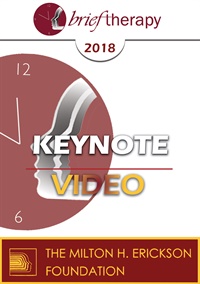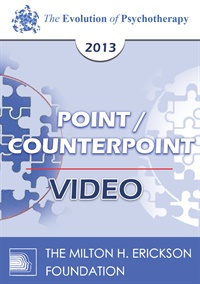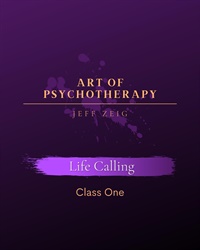
- Average Rating:
- Not yet rated
- Topic Areas:
- Utilization | Clinical Demonstrations | Psychotherapy | Therapist Development | Anxiety | Ericksonian Hypnosis and Therapy Techniques | Religion | Art of Psychotherapy
- Bundle(s):
- Art of Psychotherapy - Utilization Series
- Categories:
- Art of Psychotherapy
- Faculty:
- Jeffrey Zeig, PhD
- Course Levels:
- Master Degree or Higher in Health-Related Field
- Duration:
- 2 Hours 22 Minutes
- Format:
- Audio and Video
- Original Program Date:
- Jun 21, 2020
- Short Description:
- In our first session, our demonstration subject has recently made a major life change. They have decided to change their career from being a priest, into becoming a therapist. Big life changes like these often induce anxiety in patients, and in this clinical demonstration we see Dr. Jeffrey Zeig exhibit a number of Ericksonian techniques to help the client be in harmony with themselves. Dr. Zeig utilizes some of Ginny’s religious history to help guide her towards transformation.
- Price:
- $79.00 - Base Price
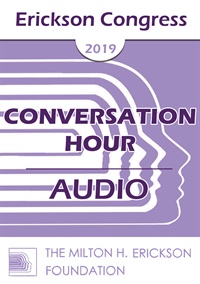
- Average Rating:
- Not yet rated
- Topic Areas:
- Conversation Hours | Meditation, Spirituality and Yoga | Multicultural | Religion
- Categories:
- Erickson Congress | Erickson Congress 2019
- Faculty:
- Tamer Dovucu, MA
- Duration:
- 57 Minutes
- Format:
- Audio Only
- Original Program Date:
- Dec 14, 2019
- Short Description:
- In Turkey I had the opportunity to research the resources about Sufism (for example Rumi is the most well known sufi in the world and he lived in Turkey) and I studied it both as a student and as a therapist about 15 years. Sufism has actually two big steps. Understanding yourself and life first by mind than by heart. While I was creating the Optimum Balance Model (OBM) I think I did the first part. During this conversation I'll try to explain steps of the inner journey of a Sufi, I'll share my experiences and the story of how they try to tame their Ego.
- Price:
- $15.00 - Base Price
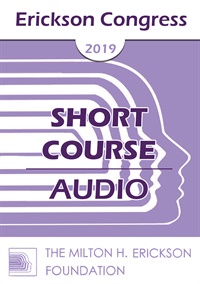
- Average Rating:
- Not yet rated
- Topic Areas:
- Short Courses | Multicultural | Religion | Community
- Categories:
- Erickson Congress | Erickson Congress 2019
- Faculty:
- Joanne Ginter, MA
- Duration:
- 1 Hour 6 Minutes
- Format:
- Audio Only
- Original Program Date:
- Dec 12, 2019
- Short Description:
- This workshop emphasizes ways culture and religion can be integrated into the therapeutic discourse through the promotion of intercultural resiliency. Interculturalism allows for relationship building and learning from each other while taking the therapist deeper than multicultural or cross-cultural communication. Resiliency as a healing process allows for creating new meanings to unfortunate life events based on developing the self through mentorship and community, the building blocks of resiliency.
- Price:
- $15.00 - Base Price
Tags: Community Multi-Cultural Religion
Credit available - Click Here for more information
- Average Rating:
- Not yet rated
- Topic Areas:
- Keynotes | Multicultural | Psychotherapy | Brief Therapy | Training
- Categories:
- Brief Therapy Conference | Brief Therapy Conference 2018 | Online Continuing Education
- Faculty:
- Patricia Arredondo, EdD
- Course Levels:
- Master Degree or Higher in Health-Related Field
- Duration:
- 1:03:49
- Format:
- Audio and Video
- Original Program Date:
- Dec 05, 2018
- Short Description:
- This session looks closely at how Latinx immigrants and their families endure, adapt, and keep moving forward in the face of political pressure, cultural disruption, and uncertainty. Drawing on lived stories, social context, and clinical perspective, it explores acculturation stress, family dynamics, identity, and resilience anchored in values like family, faith, and pride. The talk offers therapists and students a grounded way to understand immigrant experience and bring greater sensitivity and perspective into their clinical work.
- Price:
-
Sale is $29.00
price reduced from Base Price - $59.00
- Average Rating:
- Not yet rated
- Topic Areas:
- Trauma | Meditation, Spirituality and Yoga | Point/Counterpoint Sessions | Psychotherapy | Religion
- Categories:
- Evolution of Psychotherapy | Evolution of Psychotherapy 2013
- Faculty:
- Donald Meichenbaum, PhD | Kathryn Rossi, PhD | Erving Polster, PhD
- Course Levels:
- Master Degree or Higher in Health-Related Field
- Duration:
- 1:14:58
- Format:
- Audio and Video
- Original Program Date:
- Dec 14, 2013
- Short Description:
- The major way that people cope with trauma in North America is to use some form of religious or spiritual rituals and meaning-making activities . In this workshop , Dr. Meichenbaum will consider both the positive and negative modes of spiritual coping, ways to assess for client’s spirituality, and ways to integrate spiritually-based interventions into psychotherapy, where indicated.
- Price:
-
Sale is $29.00
price reduced from Base Price - $59.00
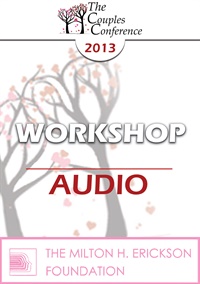
- Average Rating:
- Not yet rated
- Topic Areas:
- Couples Therapy | Meditation, Spirituality and Yoga | Workshops | Religion
- Categories:
- Couples Conference | Couples Conference 2013
- Faculty:
- Bill O'Hanlon, MS
- Duration:
- 1:42:35
- Format:
- Audio Only
- Original Program Date:
- Apr 21, 2013
- Short Description:
- Using a simple three-part model of spirituality, you’ll learn how to infuse a spiritual sensibility into couples therapy even with clients that are non-religious, dogmatically religious or who are hostile towards spirituality or religion.
- Price:
- $15.00 - Base Price
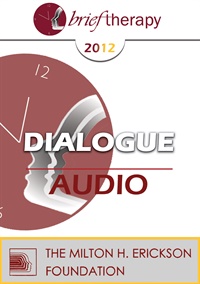
- Average Rating:
- Not yet rated
- Topic Areas:
- Infidelity | Dialogues
- Categories:
- Brief Therapy Conference | Brief Therapy Conference 2012 | Pioneers in Couples and Family Therapy
- Faculty:
- Ellyn Bader, PhD | Esther Perel, MA, LMFT | Janis Abrahms Spring, PhD, ABPP
- Duration:
- 58:47
- Format:
- Audio Only
- Original Program Date:
- Dec 07, 2012
- Short Description:
- This dialogue brings together three leading clinicians for a candid, wide ranging conversation about infidelity in contemporary relationships. They explore the trauma of discovery, the psychology of secrecy, the cultural forces reshaping sex and monogamy, and the complex motives that drive affairs today. Participants hear practical guidance on working with couples in crisis, navigating disclosure, ending relationships with integrity and helping partners rethink desire, commitment and the meanings they assign to betrayal.
- Price:
- $15.00 - Base Price
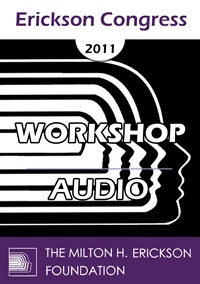
- Average Rating:
- Not yet rated
- Topic Areas:
- Psychotherapy | Workshops | Multicultural | Social Issues | Belief Systems
- Categories:
- Erickson Congress | Erickson Congress 2011
- Faculty:
- Naji Abi-Hashem, PhD
- Duration:
- 59 Minutes
- Format:
- Audio Only
- Original Program Date:
- Dec 07, 2011
- Short Description:
- This workshop examines how globalization, secularism and rising fundamentalism shape the lives of clients and caregivers in a rapidly shifting world. Through cultural analysis, personal stories and clinical reflection, the presenter explores identity, belonging, dislocation and the psychological fatigue created by constant change. Participants learn how to work sensitively across cultures, recognize their own biases, and support clients navigating polarization, loss of tradition and the search for stability and meaning.
- Price:
- $20.00 - Base Price
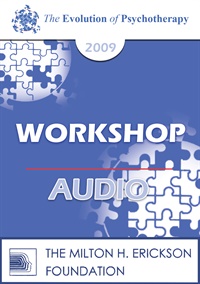
- Average Rating:
- Not yet rated
- Topic Areas:
- Workshops | Psychotherapy | Relationships | Religion | Life Focus Community
- Categories:
- Evolution of Psychotherapy | Evolution of Psychotherapy 2009
- Faculty:
- Erving Polster, PhD
- Duration:
- 1 Hour 39 Minutes
- Format:
- Audio Only
- Original Program Date:
- Dec 13, 2009
- Short Description:
- Extrapolating psychotherapy leadership private sessions into Life Focus Communities would expand therapy’s inter-relational purpose, combining the treasures of belonging with the inspirational powers of people joining together in a continuing examination of the lived life. Dr. Polster will offer some novel comparisons with religion and demonstrate through experiential exercises how such groups may be conducted.
- Price:
- $15.00 - Base Price
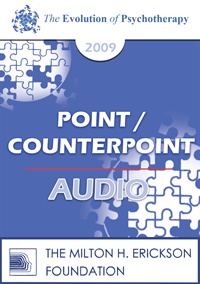
- Average Rating:
- Not yet rated
- Topic Areas:
- Point/Counterpoint Sessions | Life Focus Community | Psychotherapy | Religion
- Categories:
- Evolution of Psychotherapy | Evolution of Psychotherapy 2009
- Faculty:
- Erving Polster, PhD
- Duration:
- 1 Hour 28 Minutes
- Format:
- Audio Only
- Original Program Date:
- Dec 10, 2009
- Short Description:
- Psychotherapy, an originally private medical procedure, faces two immediate challenges: 1) an asocial pharmaceutical ethos and 2) its own populist success, which now call out for a more inclusive format. The latter represents a growing option for life-long large groups tapping the innermost sensibilities of people and creating the embodiment of belonging.
- Price:
- $15.00 - Base Price
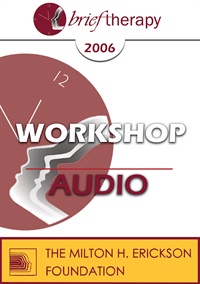
- Average Rating:
- Not yet rated
- Topic Areas:
- Workshops | Brief Therapy | Religion | Community | Life Focus Community
- Categories:
- Brief Therapy Conference | Brief Therapy Conference 2006
- Faculty:
- Erving Polster, PhD
- Duration:
- 2:09:45
- Format:
- Audio Only
- Original Program Date:
- Dec 07, 2006
- Short Description:
- With religion as a precedent and large group formation as an instrument, Dr. Polster will show how we may address the everyday, non-pathological needs of people. A complementary offshoot of these life-long groups is the reciprocal benefits it will share with brief therapy, supplying continuity to the brief therapy experience and individual focus to the large group formations.
- Price:
- $15.00 - Base Price
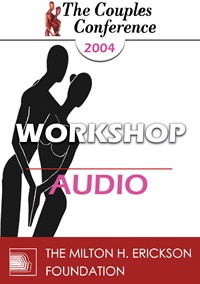
- Average Rating:
- Not yet rated
- Topic Areas:
- Workshops | Couples Therapy | Multicultural | Religion | Gender
- Categories:
- Couples Conference | Couples Conference 2004
- Faculty:
- Esther Perel, MA, LMFT
- Duration:
- 1:44:56
- Format:
- Audio Only
- Original Program Date:
- Mar 26, 2004
- Short Description:
- Cultural and religious differences provide the backdrop against which couples' issues of commitment, gender and child raising, as well as, family connectedness and cultural loyalty are played out. Mixed couples often face difficult decisions at key junctures in the life cycle. In this workshop, participants will learn to identify conflicts around culture and religion, tease out the cultural contexts of common couples' dilemmas, and help clients make informed choices about the role that group continuity, family tradition and cultural values will play in their lives.
- Price:
- $15.00 - Base Price
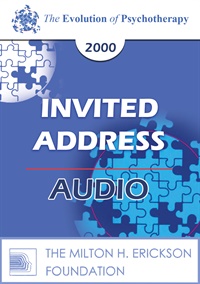
- Average Rating:
- Not yet rated
- Topic Areas:
- Suicide | Invited Addresses | Law & Ethics | Psychotherapy | Religion
- Categories:
- Evolution of Psychotherapy | Evolution of Psychotherapy 2000
- Faculty:
- Thomas Szasz, MD | James F. Masterson, MD
- Duration:
- 1 Hour 28 Minutes
- Format:
- Audio Only
- Original Program Date:
- May 25, 2000
- Short Description:
- This address is a radical inquiry into voluntary death ("death control"). Is suicide legal? Should involuntary suicide prevention be legal? Should physician-assisted suicide be legal? Personal careers, professional identities, multi-billion dollar industries, legal doctrines, judicial procedures and the liberty of every American hangs on our answers and on our justifications for them.
- Price:
- $15.00 - Base Price
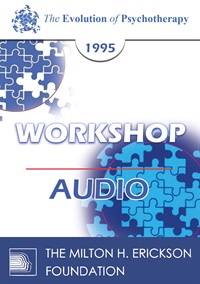
- Average Rating:
- Not yet rated
- Topic Areas:
- Workshops | Psychotherapy | Existential Therapy | Religion
- Categories:
- Evolution of Psychotherapy | Evolution of Psychotherapy 1995
- Faculty:
- Thomas Szasz, MD
- Duration:
- 2:39:51
- Format:
- Audio Only
- Original Program Date:
- Dec 14, 1995
- Short Description:
- Szasz considers the role of responsibility in religion, civil and criminal law, medicine and the mental health professions; the differences among existential responsibility, moral blameworthiness and legal accountability; that connections between (mental) competence and responsibility; and relates all of the above to problems in psychotherapeutic theory and practice.
- Price:
- $15.00 - Base Price
Tags: Existential Psychotherapy Religion
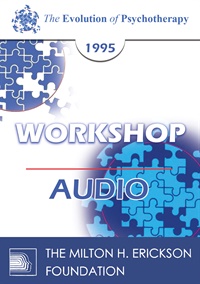
- Average Rating:
- Not yet rated
- Topic Areas:
- Workshops | Art and Creativity | Social Issues | Depression | Religion | Psychotherapy
- Categories:
- Evolution of Psychotherapy | Evolution of Psychotherapy 1995
- Faculty:
- James Hillman, PhD
- Duration:
- 2 Hours
- Format:
- Audio Only
- Original Program Date:
- Dec 14, 1995
- Short Description:
- This workshop is a phenomenology of melancholy. Jungian approaches to depression; clinical treatments, societal implications, resistances, suicidal risks and practical techniques will be demonstrated. The 50-minute, prizewinning BBC Documentary "Kind of Blue," narrated by the presenter will be featured.
- Price:
- $15.00 - Base Price
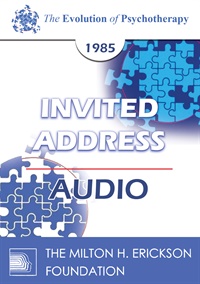
- Average Rating:
- Not yet rated
- Topic Areas:
- Invited Addresses | Psychotherapy | Religion
- Categories:
- Evolution of Psychotherapy | Evolution of Psychotherapy 1985
- Faculty:
- Thomas Szasz, MD | Rollo May, PhD
- Duration:
- 1 Hour 21 Minutes
- Format:
- Audio Only
- Original Program Date:
- Dec 13, 1985
- Short Description:
- Invited Address Session 8 - Part 2 - Justifying Coercion Through Theology and Therapy featuring Thomas S Szasz, MD. With discussant Rollo R May, PhD. Moderated by Harold Arkowitz, PhD.
- Price:
- $15.00 - Base Price
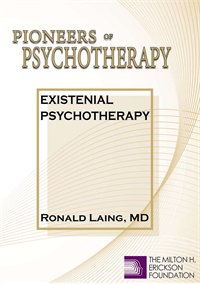
- Average Rating:
- Not yet rated
- Topic Areas:
- Clinical Demonstrations | Psychotherapy | Existential Therapy | Religion | Schizophrenia
- Bundle(s):
- Pioneers of Psychotherapy Bundle
- Categories:
- Pioneers of Psychotherapy | Evolution of Psychotherapy | Evolution of Psychotherapy 1985
- Faculty:
- Ronald Laing, MD
- Course Levels:
- Master Degree or Higher in Health-Related Field
- Duration:
- 01:11:00
- Format:
- Audio and Video
- Original Program Date:
- Dec 12, 1985
- Short Description:
- Ronald Laing (1985) interviews a home-less woman diagnosed with paranoid schizophrenia. Her presenting complaint is that her brain does not work right and that people are out to get her. Laing relates to the client and explores her theories of human conspiracy, the power of the mind and mind reading, issues of Christianity, and how these concepts relate to her.
- Price:
- $59.00 - Base Price


